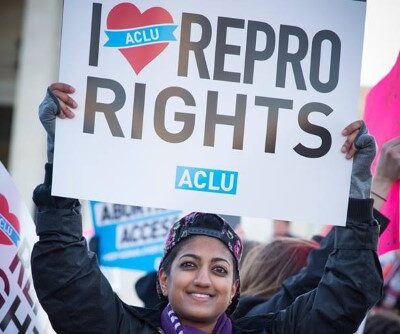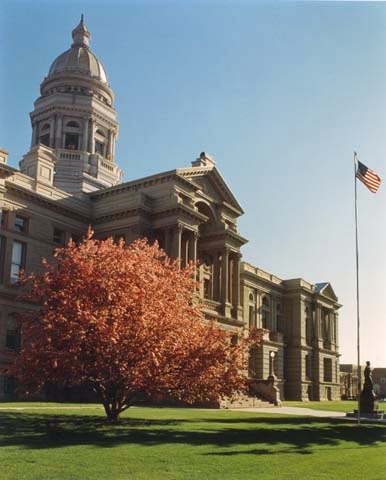News & Commentary
Apr 17, 2017
The New Era of Anti-Abortion Efforts in Wyoming
The Wyoming legislature passed the state’s first restrictions on abortion in 28 years. While these bills may not have many practical effects on a woman’s access to healthcare in our state, their passage signals a new front in the fight against abortion in the Equality State.

Jan 30, 2017
The WY Legislature just took the first step toward criminalizing pregnant women, rather than helping them.
The House Judiciary Committee just voted 6-3 to pass HB 215, taking its first step toward making Wyoming the only state in the country to criminalize women as felons for struggling with drug addictions while pregnant.

Apr 03, 2015
Here's what happened at the Capitol this year
During the 2015 Legislative Session, the ACLU of Wyoming was hard at work advocating for civil rights and fighting bills that threaten our freedoms.

Aug 26, 2013
Wyoming Has The Worst Gender Wage Gap in America
Sorry, Wyoming. You have the worst gender wage gap in America. Our state ranks dead last in the nation for the gap between the wages of men and women whether calculated by year round work or measured by hourly or weekly wages. Nationally, women working full-time make on average 77 cents for every dollar earned by men. In Wyoming, women earned only 67 cents for every dollar earned by men.To honor the 50th anniversary of the Equal Pay Act of 1963, the ACLU Women’s Rights Project has joined a coalition of national and state-based women’s rights organizations for the Equal Pay Today! Campaign which calls for an end to the gender wage gap that exists in nearly every industry and profession in the country. They are joining together to call for action to end the practices and close the loopholes in existing laws that contribute to shocking wage gap. These practices include:

Mar 01, 2013
The End of the Trail: 2013 Legislature comes to a close
The 62nd Wyoming legislature convened on January 8th for the 2013 general session and adjourned this week leaving extra days available for next year’s budget session. Tuesday night our staff celebrated at the Capitol Club's annual taco party where legislators and lobbyists have some good food and fun after all their long days.There were the inevitable disappointments this year:HB168, Representative Connolly’s domestic partnership bill, and HB169 which would have changed the definition of marriage to a contract between two natural persons, both failed. The marriage equality bill failed in committee and the domestic partnership bill failed on the House floor. It was, however, great to see all the support for the domestic partnership bill and the fact that it got to the floor was a considerable step forward. Senator Rothfuss’ discrimination bill, another pro-LGBT measure which would’ve added sexual orientation and gender identity to our discrimination law, was also defeated. It is past time that Wyoming should add this protection to its statutes, and the failure to do so was extremely troubling. Our office regularly receives complaints from LGBT employees regarding employment discrimination, and we are unable to assist them as our law provides no protections for these individuals.Another disappointment was the voting rights bill, HB129 that Rep. Dan Zwonitzer has worked so hard on – this bill died Monday on third reading in the Senate by one vote. The bill streamlined the process for non-violent felons to reclaim their right to vote. These individuals have completed their sentences and paid their debt to society, and it is a way to bring offenders back into the community as participants and should be strongly supported. These laws that disenfranchise felons came about after the civil war, part of a series of state bills, including literacy tests and poll taxes to disenfranchise newly freed slaves. It is really frustrating to see legislators continue to vote no on a bill simply because they believe that citizens that have made a mistake must be punished endlessly. Once again, our work with Sharon Breitweiser of NARAL Pro-Choice Wyoming, and Planned Parenthood, defeated two really bad anti-choice bills. Representative Kroeker sponsored HB97, which would’ve outlawed abortion after the detection of a fetal heartbeat. This bill was, of course, unconstitutional under the current case law, and after much testimony, did not come out of committee. Senator Nutting and several other legislators sponsored another bill, SF88, Woman’s right to reproductive safety and information, which Senator Nutting proclaimed was not pro or anti-abortion, but was simply a bill to provide women with necessary medical information. The bill erected as many barriers to abortion as possible, giving the usual false information about breast cancer, depression, suicide and abortion and forcing ultrasounds, listening to heartbeat, waiting period, etc. SF88 also died in committee after much testimony. This same type of legislation is brought every session with hours and hours of legislative time spent on bills that are often unconstitutional and always an absolute interference with women’s right to medical privacy and reproductive freedom. Women in Wyoming have almost no access to abortion, and many women must go out of state to receive medical care. It is estimated that there were only 5 abortions performed in Wyoming last year.Wyoming is one of the first states to pass a Juvenile Life Without Parole law; HB23 deals with the U.S Supreme Court case Miller v. Alabama. This recently decided case stated that juveniles should not be sentenced under mandatory life without parole statutes. Courts must take into consideration all of the circumstances of the crime and the individual juvenile when making sentencing decisions. This bill came out of the joint judiciary committee and was supported by both the attorney general’s and public defender’s office. It allows for the possibility of parole after 25 years. We strongly support this bill and we’re happy to see it pass. A bill that showed up again this year in the House was HB74 - Sex offenders - residence near child care facilities. This bill would have prohibited individuals on the sex offender registry from living near child care facilities. GPS maps presented to the committee showed that in many communities here in Wyoming these laws are making it impossible for offenders to live anywhere. This affects their ability to rehabilitate within the community and also has extremely negative effects on offenders’ families. The original intent of the sex offender registry was to register repeat violent offenders, but the current registry is so broad that it includes everyone convicted of any crime that is even loosely considered a sex crime. Crimes such as urinating in public or Romeo and Juliet cases can land you on the sex offender registry. The majority of calls our office has received regarding the registry are these cases where an individual was convicted of this type of Romeo and Juliet crime and is now married to the named victim, has been for a number of years, has no other convictions and still must register on the offender registry. The location of child care centers is almost impossible to keep up with as the facilities change on a monthly basis and the Department of Family Services registers only those centers that are licensed facilities. The original rationale for the prohibition of offenders living near schools was that children walked to and from school, but this is not always true of children that go to day care centers. We opposed this bill and were glad to see it voted down in committee.HB204, Katie’s Law sponsored by Representative Esquibel stated that DNA samples would be taken from every individual arrested, collected by the state and run through national data bases. This bill turns the idea that you are innocent until proven guilty on its head – if the arrestee was not convicted or charges were dropped, the arrestee would have the responsibility of getting the records and DNA destroyed at the state level, and there was no assurance that the info would be taken out of national data bases. The constitutionality of these laws is currently under review by the US Supreme Court and we should have an opinion in the spring. We testified against this bill and it died in committee.Both the Wiretap authorization bill, SF67 and HB76 the Investigative Subpoena bill broadened law enforcements ability to violate individuals’ privacy. Wiretap authorization would have allowed wiretaps on a new array of crimes outside of drug crimes, and HB76 provided for subpoenas in internet fraud cases and internet fraud was defined very broadly. Neither of these bills made it into law but we expect to see a continued effort by law enforcement and the attorney general’s office to broaden their authority to peer into individuals’ private lives.Despite 50 years of pleas for change, the legislature and the Governor continue to ignore the need to reform our juvenile justice system. Two small bills for juveniles passed this year: SF17 - Community juvenile services that would allow the county commission to apply for funds reserved for community service board grants, and another, HB175, that asks law enforcement to contact a parent or guardian when a child is issued a citation. Law enforcement was very resistant to this bill and implied in testimony that it was too much to require and they did not have the time to notify parents. Neither the school system or law enforcement must notify parents when a child is being questioned in the school, and our office gets many complaints about this. Most of our children go through adult courts which are also not compelled to notify parents that their children are in court so it seems a small effort to ask that police officer notify parents if a child is in trouble. These are the only two bills that came out of legislature this session for juvenile justice and nether one of them addresses the systemic problems that continue to plague the state. During the interim, the Joint Judiciary Committee is hoping to receive information from the Governor’s newly appointed task force on juvenile justice. At this time it is not clear what the task forces’ appointed task is.Learn more about the interim topics to be considered by the Wyoming Legislature.Wyoming was the last state in the nation without a law that addressed human trafficking, and we’re happy to see Representative Connolly’s HB133 - Human trafficking passed this session. Hopefully, this will result in more protection for the victims of these types of crimes. The rationale for the bill was that while there are federal laws against trafficking, some of the smaller cases fall through the cracks, and all states need laws in order to prosecute these cases.These are just a few of the highlights of the session and we will be releasing a complete look at our work in our legislative report that will be posted to our website in the next few weeks. It was a very successful session for us, and while I am happy for a little rest now that it’s over, it is always a pleasure to work with our Wyoming Legislature.

Jan 22, 2013
Roe v. Wade: 40th Anniversary
Forty years ago today, the Supreme Court decided Roe v. Wade, the landmark case that recognized that a pregnant woman has a right to make her own decision about whether to have a child or have an abortion. Since then, some politicians have been trying to take that decision out of a woman’s hands. Over the past two years, these efforts have reached record levels. In those two short years, our elected representatives found the time to pass almost 140 provisions designed to interfere with a woman and her family’s private decisions about whether or not to have children. Of course, we don’t all feel the same way about abortion. But we should be able to agree that important decisions like these are better made by a woman, her family, and her doctor than by politicians.Indeed, the American people have shown they don't want politicians to interfere in personal, private decision-making. This year, across the country, people came together to speak out against reproductive restrictions and those who pushed them. In states like Virginia, Oklahoma, Michigan, and Idaho, women and men took time out of their busy lives to go to their state capitols and tell their representatives to leave these decisions where they belong: with a woman, her family, and her doctor. And these folks aren’t just talking, they are voting. Recently, voters in states as diverse as Mississippi and Colorado, Florida, and North Dakota all rejected ballot measures that would have interfered with a woman’s ability to make her own decisions about pregnancy. Politicians with extreme views on the right to choose whether to have an abortion lost at the polls. In fact, Americans are so fed up with politicians trying to interfere with a woman’s private health care decision, that a Gallup poll found that 39 percent of women in 12 battleground states said abortion was the most important issue for women in the election. Incredibly, however, some politicians still haven’t gotten the message. For example, over the last two years, some politicians in the U.S. House of Representatives tried to change the definition of rape; several states passed laws mandating that a woman undergo an ultrasound and be forced to see an image before she can have an abortion; and politicians tried to give employers the right to deny a woman insurance coverage for birth control. Even some Wyoming legislators are still determined to take away a woman’s ability to make her own decisions about birth control, pregnancy, and abortion. Two legislative measures being debated in the Wyoming legislature would effectively ban almost all abortion services in Wyoming. Both HB97 and SF88 violate provisions upheld in Roe v. Wade, and amount to nothing more than governmental interference into private medical decisions of Wyoming women and their families. These attacks at the state and federal level notwithstanding, we must keep in mind two important lessons that we learned this year. First, however each of us personally feels about abortion, Americans have had enough of politicians trying to take that decision away from women and their families. Second, if we continue to speak out, we can stem this tide. We can stop politicians from interfering in a woman’s private health care decisions. So this year, when legislators in Cheyenne try to push restrictions on reproductive health care for Wyoming women, we must stand together and them realize just how out-of-touch and out-of-date they are.

Stay Informed
Sign up to be the first to hear about how to take action.
By completing this form, I agree to receive occasional emails per the terms of the ACLU’s privacy statement.
By completing this form, I agree to receive occasional emails per the terms of the ACLU’s privacy statement.
